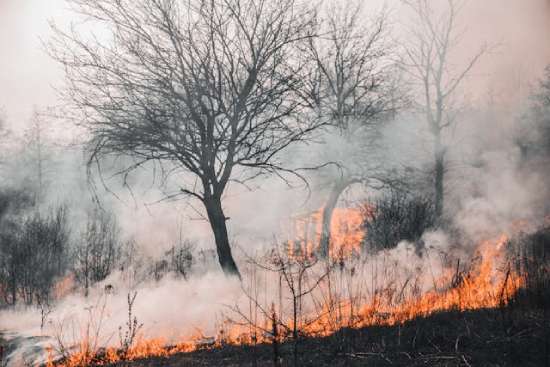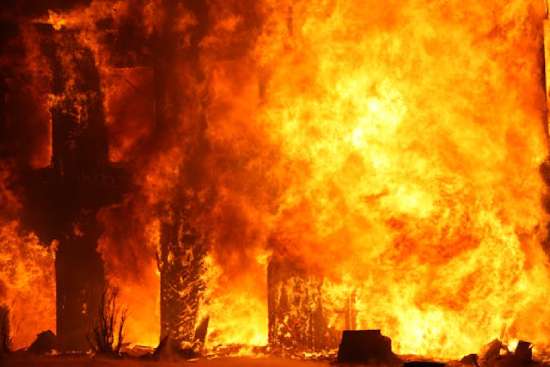If you’ve seen how the media portrays the end of the world, this phrase might make you nervous—or outright afraid.
Even without the mental images from movies or TV, the idea of the world ending still seems ominous. Each troubling story we hear about war, oppression, corruption, or disaster just adds to our collective uneasiness.
And that’s understandable. This is all we’ve known—it’s hard to even imagine that this life, as messy as it can be, could meet its extinction at some point.
Thankfully, the Seventh-day Adventist Church’s perspective on this topic offers hope amid a world that feels like it’s spiraling out of control. We turn to the Bible’s assurance that all this evil won’t continue forever. Jesus Christ will return, and He will recreate this earth to reflect its original perfection, just like things were in the Garden of Eden (Genesis 1-2).
But what do we do right now?
Adventists have historically prioritized the study of Bible prophecy, and it tells us of what kinds of things will happen before Jesus’ return. This allows us to prepare our hearts and trust in God’s guidance. So let’s take a closer look at what Scripture has to say, and how we can find profound peace in those words.
Here are some of the pertinent questions we’ll answer:
- What do Adventists believe about the end of the world?
- What events will take place right before the end of the world?
- How does this view fit with other Adventist beliefs?
- How do Adventists prepare for the end of the world?
What do Adventists believe about the end of the world?

Image by sudhanshuamazingboy from Pixabay
Adventists view the end of time through a biblical lens, looking forward to our ultimate hope—the Second Coming of Christ. This is described in our 25th Fundamental Belief.
This hope runs deep, as it was part of our roots as a church. The Adventist movement began with people who searched the Scriptures and realized the importance of seeking God and preparing for the fact that this world, as it is right now, is near its end. Our earliest pioneers eagerly waited for Jesus to return in the 1800s, though they misunderstood the timing of when this would happen.
Later on, after further study of Scripture, they realized that other events in Bible prophecy still needed to happen before Jesus could come—and that no one except for God Himself knows exactly when that day will be.
And, yes, there will be challenging times as we approach the end of the world. Jesus Himself spoke of wars, strife, natural disasters, and a general lack of love and compassion, among other signs, that would culminate in His coming (Matthew 24, Luke 21). The end times and the end of the world are the climax of the sin that has been running its natural course throughout humanity.
But at the end of the world, Satan (the devil) will work harder than ever to wreak havoc because he knows his time is short (1 Peter 5:8; Revelation 12:12).
The prophecies of Revelation 12 and 13 clue us in to a crisis of worship that will come to a head at that time. The devil will seek to oppose and deceive God’s people (Revelation 12:17), which ultimately leads everyone on earth to a once-and-for-all decision of whether to stay loyal to God or relent to the devil’s deceptions (Revelation 13).
We realize how intimidating and unsettling this all sounds. But God doesn’t give us these warnings in Scripture to scare us. Instead, He wants us to be aware of what is coming so we don’t have to be scared. And He invites us to draw close to Him and find comfort in what’s beyond the difficulties.
Though people often emphasize the negative events at the end of the world, the Bible’s emphasis is the opposite: it focuses instead on the triumph of Jesus and His people and the joy we’ll have when humanity is reunited with the fullness of God, and we’ll all live on a beautiful new earth—forever (2 Peter 3:13).
The end of this world is just one sliver of time in light of eternity.
So, what events comprise that space of time?
What events will take place right before the end of the world?

Photo by sudhanshuamazingboy
For the purpose of this page, we’re going to focus on major events that will happen right before the Second Coming of Christ, then through the re-creation of the earth. We’ll include:
- The mark of the beast crisis
- The close of probation
- The time of trouble and the seven last plagues
- The Second Coming
- The millennium
- The destruction of the wicked
- The re-creation of the earth
To find out more about events leading up to these final ones, see our comprehensive page about the signs and events that signal how near we are to the end of earth’s history.
The mark of the beast crisis
The book of Revelation warns against worshiping the beast and receiving the mark of the beast in the last days. In fact, chapters 13 and 14 help us understand that a worship crisis will take place during that time. All of humanity will be faced with the choice of whether to worship God or worship what humans have set up.
How do the beast and its mark tie in?
We’ve covered all of this in a separate article on the mark of the beast, but in summary, a “beast” in the Bible represents a religious-political power. This beast in Revelation will seek the loyalty of humanity, which in turn would lead people away from loyalty to God as sovereign. The “mark,” then, symbolizes the choice to worship this beast power rather than receive the seal of God, an inward sign of allegiance to Him.
This crisis will come to a head, leading everyone to demonstrate who they worship. At this point, everyone will know whether they have accepted or rejected God—which leads us to the next event.
The close of probation
The close of probation refers to the time at which everyone on earth will have decided for or against God. At this time, the Investigative Judgment, which happens in the heavenly sanctuary before the Second Coming (Daniel 7:9-10, 13-14), finishes.
This timing, then, is not about an act of God but is brought about by humanity.
The Bible calls the decision to turn from God the “blasphemy of the Holy Spirit” (Mark 3:29, NKJV). It occurs when an individual rejects God’s invitation for so long that they become hardened against the Holy Spirit (something Hebrews 4:7 warns God’s people about).
But there will come a point in history when all will make their ultimate decision—either keeping their hearts open to the Holy Spirit or becoming completely hardened.
For the sake of illustration, we can compare it to inviting a friend to your house for a dinner party.
You invite them, and you don’t get a response. You might check in with them one or twice, just to make sure they know they’re invited.
And if they turn you down, you might press them a little. But ultimately, you respect their decision. We usually don’t find it worth it to pester people who have already expressed their intent.
Thankfully, God is far more patient with us! He urges us and invites us so many times. Yet in the end, He must respect our choices, even when it hurts Him.
The time of trouble and the seven last plagues

Photo by Алесь Усцінаў
The Bible speaks of a time of persecution and difficulty that will take place right before the Second Coming. Revelation 7:14 hints at it by mentioning that God’s people will come out of “great tribulation” (NKJV). The book of Daniel refers to this time of trouble more explicitly (12:1-2).
This time of trouble will culminate all the wars, strife, natural disasters, and evil that have been building in intensity.
At the same time, God will send judgments—known as the seven last plagues—against those who choose to receive the mark of the beast (Revelation 15:1; 16).
Through these times of difficulty, God will protect those who have remained loyal to Him, who are eagerly awaiting the return of Jesus.
The Second Coming
The Second Coming, sometimes called Second Advent, is what God’s followers have been waiting for and longing for. At last, we get to see Jesus, the center of all our hopes!
The Bible teaches that God’s people don’t disappear from the earth in a secret rapture before the time of trouble. Instead, we’re told that we will “see the Son of Man coming on the clouds of heaven with power and great glory” (Matthew 24:30, CSB).
And when Jesus appears with a glorious scene of trumpets and angels, those who died believing in Christ will rise. Meanwhile, followers of Christ who are still alive on earth will ascend into the air to be with them (1 Corinthians 15:51-54; 1 Thessalonians 4:16-17).
Those who’ve chosen against God will die at the brightness of Jesus’ divine presence, and they will remain in their graves until after the millennium (Revelation 20:5). God’s followers, though, will have a special role in heaven during this time (Revelation 20:4).
The millennium
The millennium, a fancy word for 1,000, refers to a 1,000-year period between the Second Coming of Jesus and the final destruction of sin (Revelation 20:1-6).
During this time, the earth is desolate (Jeremiah 4:24-26), and the unrighteous are dead. Satan is “bound”—unable to do his work of deception.
Meanwhile, God’s followers are in heaven as “priests of God and of Christ, and they will reign with Him for a thousand years” (Revelation 20:6, ESV). Revelation 20:4 tells us that “the authority to judge” (ESV) is committed to them, meaning they have some involvement with God’s judgment too.
The destruction of the wicked

Photo by Vladimir Shipitsin
Revelation 20 says that at the end of the millennium, the wicked will come back to life and Satan will try to deceive them one more time to attack the New Jerusalem, which has come down from heaven (verses 7-8). Fire will come down from heaven and consume them, bringing an end to sin, the devil, his angels, and all those who have embraced sin and rejected their Creator God.
At last, the earth will be free from sin.
The re-creation of the earth
Once the earth has been cleansed with fire, it won’t stay empty. God’s followers will get front-row seats to watch Him re-create the earth into Edenic perfection once again.
It’ll be a beautiful place—free from death, mourning, crying, pain, and all the sinful things that made life difficult here on earth before (Revelation 21:4).
And best of all, God will dwell face-to-face with His people, never to be separated from them again (Revelation 21:3).
How does this view of the end times fit with other Adventist beliefs?
For Adventists, the end of the world is good news: the Bible encourages us that at the end of the world, we will be reunited with Jesus, and the battle between good and evil (called the Great Controversy), which has been raging since sin entered our world, will finally be over. Jesus is our Savior not only from sin’s power but also from a world where it’s present everywhere around us.
At last, all the evil and suffering that hurt us and hurt the heart of God will cease. And we’ll experience the joy of living in God’s presence—just as Adam and Eve did in the Garden of Eden before they were deceived.
Though the end of the world can seem scary and awful, the difficulties and challenges aren’t our focus. We don’t have to fear what will come because, as long as we have chosen to follow Jesus, He has promised to watch over, comfort, and strengthen us. The difficulties will seem so small in comparison with everything good to come.
Knowing what will happen at the end of the world also encourages us to live in readiness.
We don’t know exactly when these events will take place. The Bible tells us that we don’t know the day or the hour of Jesus’ coming (Matthew 24:36). This means we should live with the expectation that these things could be set in motion at any time.
And it gives us the desire to seek Jesus and fulfill the calling to share the everlasting Gospel of Jesus, as described in Revelation 14.
How do Adventists prepare for the end times?

Photo by Tima Miroshnichenko
Preparing for the end of the world isn’t about “prepping”—moving to a remote location, stockpiling canned foods and toilet paper, and getting ready to survive chaotic times. Far from it! The Word of God instead encourages internal preparation and an attitude of readiness to meet Jesus.
It involves committing daily to follow Jesus so that we will want to meet Him when He returns.
This kind of readiness will help to calm our fears, especially as we remember that Jesus comforts us and tells us not to be afraid (Isaiah 41:10, Matthew 24:6).
At the end of Matthew 24, the chapter about the signs of “the end of the age,” Jesus compares preparedness for the end of the world with being a “faithful and wise servant,” doing faithfully what God has called us to do.
The very next chapter, Matthew 25, provides three parables that illustrate what that means.
The first parable—the parable of the ten virgins—speaks about five wise virgins who had enough oil in their lamps while waiting for the bridegroom to arrive.
That oil symbolizes having the Holy Spirit (Zechariah 4:1-7), encouraging us to seek a personal relationship with Jesus so that He can fill us with the Holy Spirit, who guides us and comforts us.
The second parable—the parable of the talents—tells the story of three servants who received “talents,” money, from their master. Two of them took that money and multiplied it, while one hid his money in the ground out of fear.
The moral of the story?
God wants us to use the gifts and abilities He has given us. Rather than fearing the end of the world, we can be active in serving Him and sharing the Gospel as we wait for Him to return.
And finally, the third parable—the parable of the sheep and the goats—illustrates the importance of living out the love of God and caring for the less fortunate. In the parable, God commends those who have cared for Jesus by caring for “the least of these”—the hungry, the naked, the sick, and those in prison (Matthew 25:35-40, ESV).
The thread that runs through these parables is this: having a heart connection with Jesus that leads to using our gifts and abilities to serve others. This is how we prepare for the end of the world and Jesus’ Second Coming.
The end of the world—the way to a better world
Adventists find comfort and peace in what the Bible says about the end of the world. As Christians, we don’t have to fear what’s coming!
Instead, the truths of the Bible motivate us to seek Jesus more deeply and live in the way He intended us to live. Though we may not be able to control our world’s chaos as we approach its end, we can rest with certainty in the one who has promised to be with us.
The end of the world as we know it might be coming. But it’s all to prepare us for a much better world—one free from sin and all the ruin it has brought in its train.
Related Articles
More Answers
Evangelism
Evangelism is simply sharing the truths of the Bible with someone else. And Adventists are all into it.
Everything You Need to Know About an Adventist Church Potluck
Every so often, usually on a schedule ranging from once a week to once a month to once a quarter, an Adventist church will have “fellowship dinners,” often casually referred to as potlucks.
The Seventh-day Adventist Hymnal
The Seventh-day Adventist Hymnal is a songbook used worldwide by many Adventist congregations during their worship services. Since its publication in 1985, it has helped foster praise to God while reminding church members of our mission and drawing them closer to Jesus.
What Are Seventh-Day Adventist Sermons Like?
In nearly every Seventh-day Adventist Church, the sermon is the focal point of the main service—similar to many Protestant Christian denominations. It is a time of biblical instruction by the pastor, who shares what they’ve been studying in the Bible and preparing over the previous week.
Who Are Adventists
The Seventh-day Adventist Church—“Adventists” for short—is a Christian denomination of ordinary people who seek to follow Jesus and live out His mission in this world. Established in 1863, we hold to the Protestant principle of sola scriptura, which means the Bible guides everything we do.
Why is the Great Controversy in my mailbox?
Every year, households across North America receive free copies of a 150-year-old book, The Great Controversy. Millions more are shared around the world.
How do Adventists choose what to eat?
Food blogs overwhelm the internet; food fads are all the rage; and copycat and healthy versions of food are the subject of many a get-together.










